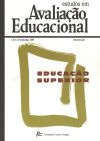Contribuições do Portfólio para a avaliação do aluno universitário
DOI:
https://doi.org/10.18222/eae204320092047Keywords:
Representação Social, Avaliação da Educação, Formação de Professores, Ensino SuperiorAbstract
Este artigo constitui-se em síntese de uma pesquisa mais ampla e tem o propósito de investigar se a ideia do Portfólio, implantada em uma instituição, vem modificando a forma de pensar a avaliação, no âmbito da formação de educadores. O referencial teórico foi alicerçado em autores do campo da avaliação educacional e nos fundamentos da Teoria das Representações Sociais. As trilhas metodológicas percorridas possibilitaram-nos a coleta e o processamento de um conjunto diversificado de informações. Utilizando os programas EVOC e ALCESTE, foi possível realizar análises específicas dos dados. Os resultados permitiram identificar três grupos de alunos: os que aprovam a avaliação realizada por Portfólio; os que desaprovam; e os que aprovam, mas com ressalvas. Tais resultados nos levam a considerar a necessidade de aprofundar argumentos no sentido de favorecer os processos de ancoragem que irão facilitar não somente a aceitação do Portfólio, mas também sua possível utilização quando esses alunos desenvolverem sua prática como professores.Downloads
Downloads
Published
How to Cite
Issue
Section
License
Authors who publish in this journal agree to the following terms:
a. Authors retain the copyright and grant the journal the right to first publication, with the paper simultaneously licensed under the Creative Commons Attribution license that allows the sharing of the paper with acknowledgment of authorship and initial publication in this journal.
b. Authors are authorized to assume additional contracts separately, for non-exclusive distribution of the version of the paper published in this journal (for example publishing in institutional repository or as a book chapter), with acknowledgment of authorship and initial publication in this journal.
c. Authors are allowed and encouraged to publish and distribute their paper on-line (for example in institutional repositories or on their personal page) at any moment before or during the editorial process, as this can generate productive changes, as well as increase the impact and citation of the published paper (See The Effect of Open Access).





